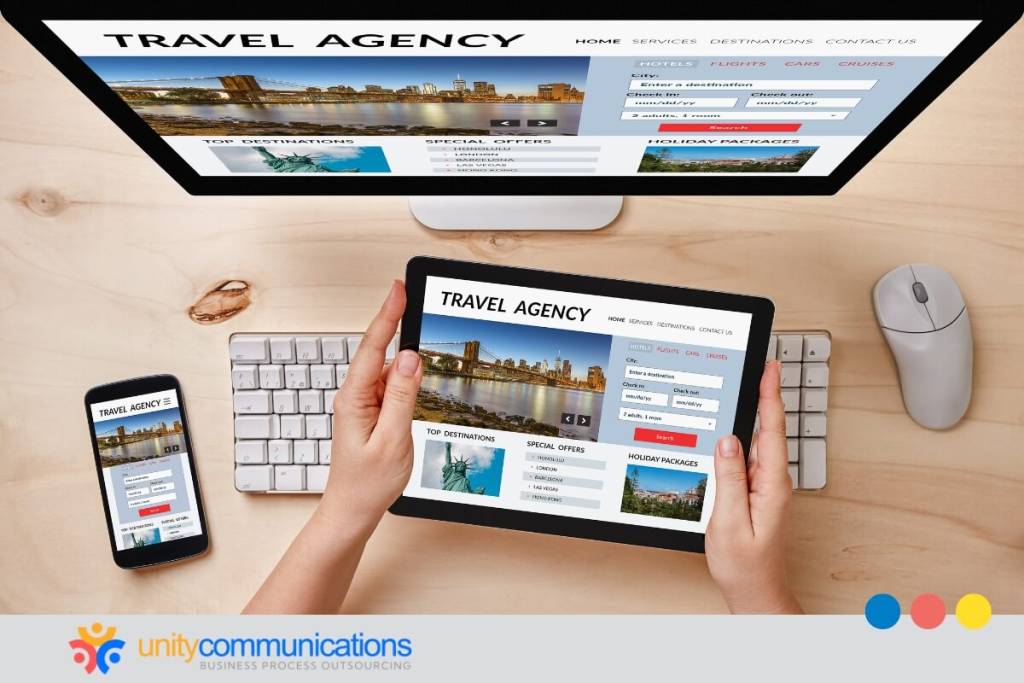IN THIS ARTICLE
Table of Contents
The travel industry is experiencing significant transformations driven by technological advancements and shifting consumer preferences. Thus, adapting to new operational challenges is more critical than ever.
Business process outsourcing (BPO) has emerged as a viable strategy to keep pace in the ever-changing travel industry. It involves delegating specific processes to third parties, allowing agencies to enhance focus on core operations.
Travel BPO offers businesses many advantages, such as improved customer service, optimized costs, and specialized expertise and technologies. More importantly, it unlocks operational efficiency. Read on to learn more about the significant benefits of outsourcing for travel agencies!
Enhanced customer service

Customer support in the travel industry ranges from answering inquiries to assisting with travel requirements and documents. No matter the concern, agencies must strive to meet the high expectations of modern travelers.
Travel agencies can provide specialized, round-the-clock support through outsourcing, ensuring exceptional customer service at all touchpoints.
Quality support
One of the main benefits of outsourcing for travel agencies is access to a pool of top-notch specialized customer support professionals. These experts can promptly and adequately handle travel-related inquiries and concerns, from booking and itinerary changes to unexpected emergencies.
The customer’s interaction and satisfaction with a company’s support team are what define the customer support experience. Suppose a traveler wanted to change their flight. They contacted the travel agency and were pleased by the prompt service of the third-party support team.
Outsourcing enhances support quality and elevates the customer experience by offering access to specialized expertise. It significantly boosts travel agencies’ reputations and drives customer loyalty.
Extended availability
The online travel industry saw a significant increase in market size in 2023. After dropping to $225 billion in 2020, global revenue rebounded in 2022 and nearly reached $600 billion in 2023. Projections indicate continued growth, with revenue expected to surpass $800 billion by 2028.
This rapid market expansion translates to fast-growing customer demands. Travel agencies can leverage third-party customer support teams that offer 24/7 availability to effectively manage this surge.
Round-the-clock availability is crucial in the travel industry, as emergencies and last-minute changes can occur unexpectedly. Outsourcing firms offer global teams across different time zones, so customers can get assistance anytime, regardless of their location.
This continuous support makes travelers feel secure and confident, enhancing their overall experience.
Reduced costs and other financial benefits of outsourcing for travel agencies

Travel companies new to outsourcing might not just be asking, “What is BPO?” Considering cost efficiency is the main benefit of outsourcing for travel agencies, they might wonder precisely how outsourcing works to reduce operational expenses and promote financial benefits.
BPO in travel and tourism entails contracting third-party services for specific tasks. This strategy increases profitability as BPO solutions adapt to changing demands and optimize operating costs.
Here’s how:
Scaling operations
Outsourcing benefits travel agencies, especially during times of fluctuating demands. It enables flexibility and cost-efficiency while adjusting operational capacity. Instead of managing a permanent internal workforce, companies can seamlessly scale BPO teams up during peak seasons or down during quieter periods.
For instance, a travel business expects more customers during the busiest travel days, such as Christmas, summertime, and spring break. With outsourcing, the agency can efficiently meet customer demands without incurring the costs of maintaining excess staff. It can also optimize resources to serve all customers while maintaining profitability.
Optimizing costs
Outsourcing travel agency operations significantly minimizes overhead costs for maintaining physical office spaces and a full-time workforce. BPO workers manage outsourced functions using the service provider’s resources. Travel businesses don’t need to expand their offices, invest in additional equipment, and apply for new employee benefits.
This shift in operational management allows agencies to allocate financial resources more strategically, potentially redirecting savings toward enhancing customer experiences or investing in growth initiatives.
Enhancing financial management
Outsourcing lets agencies shift from fixed to variable costs and pay for services based on usage and demand rather than incur constant overhead expenses. This payment model allows them to align their expenditures with actual business needs and revenue fluctuations.
Outsourcing reduces the need for significant upfront investments in infrastructure and personnel, enabling travel agencies to allocate resources more efficiently. It can also streamline cost management and improve cash flow, providing agencies with greater financial stability and the ability to invest in growth opportunities and strategic initiatives.
Improved access to advanced technology and expertise

Advanced technology is crucial for travel agencies seeking to innovate and meet travelers’ evolving demands. Outsourcing enables agencies to harness cutting-edge tools and leverage specialized knowledge to stay at the forefront of industry trends and deliver excellent services.
Technological benefits
Partnering with outsourcing firms provides travel agencies access to advanced technologies they might not otherwise afford or manage internally. Examples include sophisticated booking systems, customer relationship management (CRM) tools, and data analytics platforms.
With these tools, agencies can streamline their operations and enhance booking efficiency. These innovations also provide agencies with robust analytical capabilities, which they can use to gain deeper insights into customer preferences and improve overall service delivery.
Expert staffing
Outsourcing deploys skilled professionals to augment travel agencies’ services. These experts possess specialized knowledge in travel regulations, customer service best practices, and booking management. They are well-trained and experienced in handling diverse customer needs, evolving business processes, and more.
By outsourcing customer support and other specialized tasks, travel agencies can comply with regulatory requirements, personalize assistance to travelers, and maintain high-quality service standards. Outsourcing enhances agency expertise and delivers reliable travel services, boosting a company’s reputation and customer satisfaction.
The bottom line
Outsourcing gives travel agencies numerous advantages, such as enhanced customer service, reduced operating costs, advanced technology, and industry experts.
Travel companies should consider outsourcing non-core business functions to reliable service providers to boost their operational efficiency and meet the needs of modern customers. By embracing the benefits of outsourcing, travel agencies can stay competitive in a rapidly evolving industry.
Want to learn more about outsourcing? Let’s connect and discuss how it unlocks efficiency in your business operations! Unity Communications is an award-winning provider of outstanding BPO solutions.





